FINTONA FILE
SPRING / SUMMER 2022
The Bi-Annual Magazine of Fintona Girls’ School


The Bi-Annual Magazine of Fintona Girls’ School

problem solve and to engage in the world around them. The walls of the institution disappear and in a metaphoric sense the mind can be set free. There is evidence that suggests that through ‘beyond the classroom’ experiences, students become more engaged and motivated to the point where they build greater connections to, and have greater recall of their studies.
The School’s Connections Program has been extraordinarily successful in terms of the experiences it gifts our Year 9 students which is evident in the following student reflection:
The word ‘beyond’ conjures up an array of possibilities. The thought of going beyond something is inherently inspirational, whether it is in the context of an idea, a feeling, an action, or a decision; to go beyond implies largesse and the potential for great things.
The one and only moon landing of 1969, brought the world a truly defining ‘beyond’ moment that was an example of extreme human endeavour and capability. Recently, NASA’s new moon rocket, Artemis, blasted off on its debut flight, bringing the United States closer to its goal of putting astronauts on the lunar surface again by 2025. And yes, Buzz Lightyear’s refrain, ‘To infinity and beyond!’ does spring to mind.
In education, applying the notion of ‘beyond’ is also an exciting concept and the term ‘beyond the classroom’ specifically, provides educators a plethora of ideas and ways to grow the minds of young people. Over decades, Fintona students have been leaving the confines of four walls, as part of the school curriculum, and engaging with the outside world via excursions, field trips, camps, volunteering, and competitions. Pre-pandemic, students were also participants in overseas exchanges and trips, including World Challenge opportunities which we hope, in time, will all be reinstated.
Stepping away from desks, devices and screens, and moving into another environment, creates an opportunity for student-centric learning. This type of learning acknowledges and draws on a broader socio-cultural context and encourages students to think laterally,
Throughout this second semester, students at Fintona have continued to be involved in a wide range of activities: science and mathematics competitions, Ethics Olympiad, DaVinci Decathlon, debating, Tournament of Minds, Projec10, BrainSTEM Innovation Challenge, constitutional convention, consent workshops, visits by Murrundindi, and many other activities to extend and enrich their learning.

Fintona’s Work Experience Program is another example of how we can prepare our students for the future, building on their independence and sense of achievement and empowering them to be engaged moral agents in society. Learning outside or beyond the classroom is experiential and as such offers opportunities for students to be active and to become more interactive.
The Connections Program allowed us to gain a greater awareness of people who support our communities and become more aware and open-minded. It encouraged greater responsibility, independence, reasoning and negotiation, open-mindedness, and awareness. It showed us how to be active members of our communities and was overall an incredibly valuable and memorable experience that we will all carry with us throughout our lives.
Further, ‘beyond the classroom’ involvements are imperative to the development and reinforcement of a positive and rewarding teacher/student relationship and allows educators to become mentors and guides for the students in their care. Teachers are there to support, encourage and challenge their students thinking and being.
I am always impressed with the way our students and staff do not subscribe to limits, and go ‘beyond’, in everything they do daily.
Rachael Falloon Principal‘Once we accept our limits, we go beyond them.’ Albert Einstein

The 2022 Annual Music Concert, held at the Melbourne Recital Centre, was a true testament to the quality of our instrumental and ensemble music program. The depth of talent, from our youngest musicians in Year 2 right through to our seasoned Year 12 performers, ensured the concert had a little bit of everything. The evening featured works performed by the Chamber Orchestra, jazz standards, contemporary
rock and pop songs, all students in Year 5 and 6 on stage in a combined orchestra setting performing In the Hall of the Mountain King by Edvard Grieg, a celebrated rendition of Ain’t No Mountain High Enough by Fintona’s Music staff… and much more. The passion, skill and dedication of Fintona’s musicians reverberated throughout the Elisabeth Murdoch Hall on this special and memorable evening.


‘The Annual Music Concert made an extremely successful comeback after the past two years of being missed. All students participating in music had the chance to perform. We all had an incredibly fun time performing together and sharing our passion for music, making it an unforgettable concert. Thank you to Ms Heath and the Music Department for organising this special evening, and the music students for making it an amazing night to remember!’ Amelie, Music Captain 2022

The Innovation Challenge is a 12-week program for Year 9 and 10 students who are curious about pursuing study or a career in STEM. Run by BrainSTEM and supported by the Royal Society of Victoria (Science), students are paired with an industry mentor and challenged to develop solutions to real-world problems using the scientific process.
In Terms 3 and 4, Kiana (Year 9), Mathangi, Emma, Justina and Sudiksha (Year 10) worked closely with their supervising teacher, Aarti Ram and industry mentor, Dr Amy Gelmi, Vice Chancellor’s Research Fellowship at RMIT University, to make education more accessible for kinaesthetic and vision impaired learners.

Students engaged with Stanford University’s Design Thinking Process to identify an area of focus, research and gather baseline data, develop concepts and create prototypes of potential solutions. Reflecting on her experience, Mathangi said she particularly enjoyed the ideation process, ‘we started off with big ideas and then realised that we did not have access to the resources. This step made us think more realistically and it really stretched our thinking.’
In their presentation to participating schools, BrainSTEM leaders, industry mentors and invited guests, Fintona’s team shared their concept and working prototype for an accessible chemistry set and fidget pen. Justina and Sudiksha said these solutions were chosen because the group wanted to create something meaningful and these two ideas were achievable in the given timeframe.
The challenge has inspired students, and they have expressed a desire to continue working on their prototypes to refine them. ‘Figuring out the mechanics of the fidget pen was tricky, especially because we wanted to create a functional prototype. The current prototype can definitely be improved on,’ said Emma.
After a successful first year of participating in the Innovation Challenge, Fintona’s Learning Support Leader, Aarti is already looking forward to the next group of students who will take up the challenge in 2023.
‘I found that the team was full of fantastic ideas and excited to make science in schools more accessible. I was impressed with their initiative and how quickly they made their idea come to life.’ Dr Amy Gelmi
Alongside representing Fintona as Debating Captain, Livia has been a member of the Victorian State Debating Team and the Australian National Debating Team in 2021 and 2022. This year, Livia was awarded best speaker for the Camberwell region and the State Swannie Award for best speaker in Victoria by the Debaters Association of Victoria (DAV). The Swannie Award recognises the height of excellence in the DAV.

Here, Livia shares what she has gained from debating and why she recommends others learn the powerful art of argument.
One of the longest and most intense debates I’ve ever spoken in was not about politics, or international affairs, or whether schools should have uniforms. It was about how to make Bolognese. You see, I’m very, very passionate about my pasta, and apparently so were the other members of the state debating team who I was training with. Our lunchtime was supposed to be a break from debates – but this time, it definitely wasn’t. Should you have celery in your Bolognese sauce? No. What about carrots? If you really want. What vegetables do you use then? Eggplant, obviously. Thickens the sauce amazingly if you let it simmer for long enough. Questions regarding what kind of meat you should use (a mixture of beef and pork, by the way) led to a bizarre discussion of whether the meat is or isn’t considered a part of the sauce itself.
It was hectic, and ridiculous, and there were no rules. But when I consider what debating is, and what it has given me, this is the memory which seems like the obvious answer. The argument was comical, because it wasn’t just a comparison of our deeply contrasting opinions, but heavily reasoned.
The art of argument, even in more intellectual debates about politics, or international affairs, or whether schools should have uniforms, remains the same. Debating teaches you to present reasons for your opinions, by always explaining the consequences and value that your opinions might have. And it teaches you to express those opinions boldly and without fear. This confidence, this development of reasoning skills, can only be developed one way: practice. And while there are many ways to find that practice, debating is the best. It forces you to practise argument in your own words, not the words of others, and teaches you to be comfortable with doing so in front of anyone.
Debating is unique because of the other people in the room. The audience, the target of your persuasion, are frightening because they are listening to you. But their listening is also what makes your speech powerful, and able to elicit emotional responses. They encourage you, through their listening, to try to make them laugh, or cry, or clench their fists with outrage. The others in the room –the opposition – are there to challenge your thinking. They will push against your weaker arguments, and in repairing them you will learn to make them stronger. Both audience and opposition push you to be better, creating an environment which will encourage you to always sharpen your analysis and embellish your delivery. While this challenge is not an easy one to rise to, in return it offers you the rewards of improving your argumentative skills, boosting your confidence, and the opportunity to make friends. The chance to so rigorously improve is rare, and when it presents itself, it is undeniably worth taking.
Livia Debating Captain‘Fintona is a leading school. We also need to be leading in our sustainability efforts to look after the future of our students and our school.’ Anastasia Klingberg, Business Manager and Chair of Fintona’s Sustainability Committee.

Earlier this year, Fintona commissioned Mamachi Pty Ltd to audit the school’s energy usage and sustainability practices. The final report commended Fintona for being well along the pathway towards 100% renewable energy, and for developing a strong foundation for future sustainability.
The outcome of the audit is evidence of the culture of sustainability that, through the passion and dedication of students and staff, has flourished in recent years. This culture begins in the classroom and is enhanced through initiatives such as the Gardening Club, led by Fintona’s Gardener, Helen Kinross, the student-led Green Team, and the Sustainability Committee established in 2022.
About her work with students in the Gardening Club, Helen says, ‘I want to introduce more aspects of nature and the environment to students. Research has shown that access to nature increases health and wellbeing. And they love it.’
A farm-to-table approach to growing food has resulted in Middle School gardening students supplying the Cooking Club with

vegetables, and staff gratefully receiving a salad freshly harvested and made by Junior School students. Profits from the sale of Fintona’s vegetables by students also funded a new greenhouse on the Senior Campus.

‘I love seeing the enjoyment the girls get from the Gardening Club and how much they learn from it. Their excitement makes the work worthwhile,’ said Helen.
This enjoyment and passion developed in younger year levels continues into the Senior School as students lead school-wide sustainability initiatives. This year, Fintona’s Green Team proposed and supported the implementation of a new waste management system to separate food waste, recycling and landfill; led the creation of a collaborative mural made from plastic waste; and created the proposal for the Boroondara Schools Climate Summit, currently in its planning stage.
‘I hope this inspires future leaders to take an active approach, and raise awareness about the current climate crisis. This year has shown how teamwork can lead to achieving some great sustainability goals,’ said Shivangi, 2022 Environment Captain.
The passion of students is resoundingly supported by staff, and the newly established Sustainability Committee has strengthened the ability for students, teachers and General Staff to work collaboratively on sustainability outcomes. Anastasia Klingberg, Business Manager and Chair of the Sustainability Committee, is proud of the many practical steps taken to reduce Fintona’s carbon footprint. And while many of the steps, such as measures to reduce paper and printing, and improving efficiency in water and energy usage, may go unnoticed, their impact will be significant for current and future Fintonians.
Addressing the next generation of students who will continue to build Fintona’s culture of sustainability, outgoing School Consul, Genevieve says, ‘To those in the future who will continue to improve and increase awareness for the environment, we are so grateful. Sustainability is vital for providing for the next generation and essential for ensuring we leave the planet in better shape than we found it.’

As the ELC children continue to learn and explore Indigenous Culture, this year they have shown a great interest in Aboriginal symbols. They were able to investigate using text and artwork, the various patterns and detail involved in creating the symbols and what they represent. They began to understand that these symbols have an important role in storytelling, are represented in artwork and have been used for over 60,000 years. Symbols play a role in sharing traditions, knowledge and stories in Aboriginal culture. The children explored literature and pieces of Aboriginal artwork in the classroom to develop a deeper understanding of how symbols are used. These interactions enabled the children to identify and feel confident creating their own symbols, as was reflected in the ELC Art Exhibition during Term 3, where the many symbols drawn by the children were displayed on long cylinders.
To extend this learning, the ELC children were excited to welcome contemporary Indigenous artist, Bayley Misfud. Bayley’s Aboriginal name is Merindah-Gunya meaning “Beautiful Spirit” in Peek Wurrong language. Merindah-Gunya shared stories from her culture and a number of Aboriginal symbols used in Victoria, she explained that these symbols act as a ‘birds eye view’ of the land and animals. She also discussed how they could be used in art to tell stories and how these symbols varied from state to state in Australia. The children were keen to share with Merindah-Gunya the symbols they knew from their prior learning. According to Merindah-Gunya she ‘absolutely loved teaching the boys and girls about Aboriginal symbols and how to use them to tell a story as they were really engaged and had a lot to say about what was special to them.’
Witchetty grub Harvey - it’s a bug, Aboriginal people can eat them and they live in the ground
Meeting place Effe - you sit on a mat Eden – you sit with your friends Iris – you can do listening
People sitting Ella-Grace - they are sitting in a circle crossing their legs Kailyn - they may be talking to each other
The children then worked on two artworks with Merindah-Gunya, each child individually selected a symbol to paint and a favourite colour, to create beautiful, vibrant collaborative pieces of art to be displayed in the ELC Piazza to be shared with the Fintona community.
Merindah-Gunya’s visit to the ELC was very successful in that it showcased the children’s understanding and learning of the Aboriginal symbols relevant to Victoria.
 Amy Goodale ELC Teacher
Amy Goodale ELC Teacher
The Outdoor Education journey at Fintona is upheld by three pillars: – Self-sustainability: developing resilience, respect and responsibility for self; – Community sustainability: developing respect and responsibility for others; and – Environmental sustainability: developing respect and responsibility for the environment.
For their first Outdoor Education camp, the Year 1 class headed to Lady Northcote YMCA.
‘Something challenging on camp was the low ropes because I nearly fell off the log.’
Claire
‘My favourite activity on camp was the flying fox because it was fun, and I pulled the rope.’
Olivia
‘Something that was challenging on camp was orienteering because we had to think about the answer to the clue and find things around camp.’ Alice
‘My favourite activity was low ropes because it was challenging.’ Mackenzie

At Fintona, the Outdoor Education experience begins in Year 1 with an overnight stay, and by Year 7 students progress to a week-long camp. Camps aim to extend students outside their comfort zone by placing them in environments different from those that they experience in everyday life. Each camp builds on the skills students learned in the previous year as well as those taught implicitly at Fintona.
The students spent the afternoon making pizzas in the Kitchen Garden and zooming down the Flying Fox. The next day, activities saw the students practising their balancing skills on the low ropes course and searching for markers around the campsite for an orienteering activity. These activities provided opportunities for the students to work with others in a team, learn about the natural world and be courageous. On the return to school, the students reflected on their time at camp, including the things they enjoyed most and the activities that challenged them.
‘My favourite activity on camp was orienteering because our group, The Wombats, won.’ Kaitlyn
‘My favourite activity on camp was the Kitchen Garden because I got to eat the pizza I made.’ Chloe
Lauren Crockett Year 1 TeacherLaura in Year 9 has had great success in several elite level maths competitions. This year, Laura was awarded a prize in the Australian Intermediate Mathematics Olympiad (AIMO) and Australian Mathematics Competition (AMC), a Silver Medal in the Australian Mathematics Olympiad (AMO), and a Gold Medal in the
Australian Maths Olympiad Committee (AMOC) Senior Contest. Laura also received an invitation to participate in the AMOC School of Excellence Senior Stream. Outside of school, Laura also competed in the University of Melbourne School Mathematics Olympiad (SMO) where her team came third and will now compete in the University School Maths Olympics contest.

Congratulations to Maya in Year 12 who was one of five winners in the 2022 Australian Economics Olympiad. The Olympiad is a series of fun and challenging activities aimed at refining and testing secondary school students’ knowledge of economics.
Maya travelled to Sydney for the award ceremony at the Reserve Bank of Australia. Maya had the opportunity to speak with economists in the research and modelling departments and met the Assistant Governor, Luci Ellis, Deputy Governor, Michele Bullock, and Governor, Phillip Lowe, all of whom shared valuable insights. ‘It was intriguing to hear about their lives and journeys to get to their current roles, and I am grateful to the RBA, the Education Department, and the Australian Economics Olympiad organisation for this unique opportunity,’ said Maya.
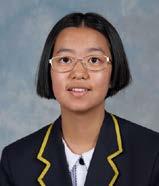
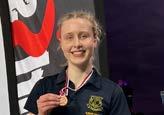
In Girls Sport Victoria (GSV) sport, Fintona’s Junior Hockey Team won the B Grand Final against Melbourne Girls Grammar with a score of 2 to 1.
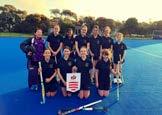
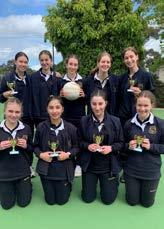
In the Boroondara Netball Association’s Winter Competition, the Finches Team won their Grand Final against Genazzano scoring 31 goals to 10. Well done to all the hockey and netball players.
Zoe in Year 11 took out third place in the 400m Final and second in the 800m Final at the GSV Track and Field Finals and ran personal bests in both. Zoe has been running since she was seven and loves that it’s a sport that pushes her to her physical and mental limits.

Congratulations to Abby in Year 8 who, with her team, Eclipse, was awarded a Silver Medal at the Australian Figure Skating Championships in Brisbane. Abby has been skating for five years, she trains up to four times a week and loves being part of a team sport.
As a member of the Victorian team, Eliza in Year 7 competed at the National U13’s Hockey Championships in Hobart this year. It was a tough tournament with 11 hardfought, nail-biting games in just eight days. Eliza was regularly acknowledged by opposition coaches for her fearless running into the direct line of fire from opposition forwards during short corners, as well as her ‘elite’ defensive pressure.
‘I learnt a lot about myself and the game of hockey and most importantly I learnt about handling pressure and building resilience. Overall it was a lot of fun and I look forward to doing it again,’ said Eliza.

When asked about learning Geography, one of our Middle School students responded insightfully saying that, ‘Geography opens a window for us to learn about, and connect with, the world around us. We are encouraged to consider the future of the planet and what we can do to protect it.’ Our students at Fintona really are curious about the diversity of the world’s places, peoples, cultures, and environments.
The word education has its origins in the Latin word ‘educere’ which means to ‘lead or draw something out’ of oneself. However, at times education has become more focused on careers than on providing the opportunity for students to be truly ‘educated’ – to develop and expand the knowledge and skills that will enable them to fulfill their potential and become well-rounded graduates and future citizens. Among the Business Council of Australia’s top employability skills are problem-solving, critical thinking and teamwork. Creating ‘job-ready graduates’ can diminish these skills and the true purpose of education. The study of Geography develops students’ ability to question, think critically, solve problems, and communicate effectively, the skills that employers are really looking for.

In the past, Geography lessons focused on learning capital cities, rivers and key features
of countries of the world. Geography now asks students to determine how they will choose to respond to the myriad of environmental and social issues humans face. Year 7 students who study the uneven distribution of water resources, and Year 10 students who study the disparity of wealth and wellbeing around the world (and in our own country), analyse the causes, impacts and responses to these issues. Geography students learn to understand such global issues and build capacity to be active and informed citizens. Geography provides the perfect vehicle for students to evaluate the sustainability of our interactions with the world around us, as individuals, as a school and as a species. More than ever, knowing how to use our resources responsibly is vital for both present and future generations.
Studying Geography develops an array of intellectual, spatial, and practical skills. Students enjoy going on fieldtrips as they learn about places themselves by observing, collecting and recording information and data and then by representing, analysing and communicating their findings.
Thus, Geography has a distinctive and vital place in the curriculum, for the future of our planet. Perhaps the last word should come from another Middle School student at Fintona:
‘I like Geography because of the relation it has to the real world. It’s very hands-on and engaging. It really encourages us to think.’
Alex Rossimel Humanities Learning LeaderPhysical Education (PE) is a vital aspect of the curriculum at Fintona and the holistic wellbeing of young women. We provide an abundance of opportunities for students to be involved in all aspects of PE and sport, helping to improve their skills, fitness levels, resilience, and overall enjoyment of being active.
Students in Years 5 to 10 participate in a wide range of physical activity during their PE classes, while Year 11 and 12 students have the opportunity to be active through a recreational sport lesson once a fortnight. In addition to these classes students are encouraged to be active through structured sports and recreation activities.
The Year 10 PE curriculum supports students to develop and apply strategies for maintaining a positive outlook and evaluating behavioural expectations in different leisure and social situations. Girls learn to critically analyse health and physical activity information to implement personalised plans for maintaining healthy and active habits. The final unit for Year 10 focuses on Lifestyle Fitness. Students participate in a range of physical activities to design and evaluate participation strategies that promote health and social outcomes for themselves and their communities. Over five weeks, students participate in a running and boxing session, an Amazing Race around the school grounds, a water aerobics class, and across the final two weeks they alternate between a yoga and spin class at the Hawthorn YMCA.
Students are assessed based on their:
– Attitude and participation - engagement and willingness throughout all activities. – Leadership - ability to support, encourage and communicate effectively with peers during group activities. – Technique and cardiovascular endurance - the ability to complete the movements.
Throughout each session, students discuss the importance of structured and unstructured physical activity, the relationship between physical activity and health and wellbeing indicators, and how sedentary behaviour (sitting time) increases the risk of obesity and chronic disease. The benefits of physical activity can be felt both inside and out. It reduces the risk of cardiovascular disease and osteoporosis, alleviates depression and anxiety and can boost mental alertness.
The Lifestyle Fitness unit is included in the Year 10 curriculum to better prepare students to manage their health and wellbeing through their VCE studies. The unit also provides students with health promotion knowledge they can draw upon beyond Fintona.


 Sarah Bell PE Coordinator
Sarah Bell PE Coordinator
Ness has been Fintona’s Head Netball Coach since 2019, and during that time the number of netball teams has increased from six to twelve. Not only does Ness have an impressive list of coaching credentials but she also has an interesting background as a filmmaker and artist. Ness recently achieved her Advanced Coaching Certificate through Netball Australia and has been appointed the Coaching Director of Boroondara’s Representative Netball Program where she oversees the coordination of 500 players.
You have a background in the Arts, can you tell us more about this?
I completed an Arts Degree at La Trobe University, studying cinema studies and drama. As part of my final year of drama, I wrote and produced a stage play that was then accepted into an international playwright’s festival. After travelling overseas for a few years, I completed a Diploma of Video Production which was a hands-on learning experience and gave me the
industry connections I needed to get started.
I won a Dendy Award and National Geographic Best Documentary award for a film I made for SBS in 2000. It was a film called ‘The Last Pecheniuk’ which focused on my aunt who had been missing for over 20 years, my Russian heritage, and the events that led to changing my name.
After starting a family, I studied Fine Art at Swinburne and as part of the course, I volunteered at an art gallery which then led to a permanent job. As an artist, I had three sell out solo shows, which was both confronting and exciting all at the same time. I mostly made works that involved mixed media and sculpture focused on feminism and how the female form is perceived.
How have the skills you developed in the arts benefited your coaching?
I believe creative thinking and expression has helped me empathise with netball players as well as find new ways to teach a skill. Working with teams of people for a singular goal is a big part of filmmaking and applies to coaching. Organising my time and clear communication have all been things I have used as a netball coach too.
What sport did you enjoy at school?
Growing up I learnt ballet which I loved for its creativity and physical challenge. I played netball as well and although I was good at it due to my height, it wasn’t until I returned to the sport as a social and fitness activity as an adult that I really embraced it.
What do you find rewarding about coaching netball?

Seeing a player apply what you have been teaching is very rewarding; the ‘aha’ moment. I love it when players turn and look at me during a game with the ‘I get it’ facial expression and when they enjoy and share my passion for netball. I like to think that I am supporting young women to empower themselves, work in teams and develop personal discipline.
Are you involved in sport outside of Fintona?
I am a Coach Director for Boroondara Representative Netball, the coach of the Express Talent Squad for Boroondara Victorian Netball League and for Netball Victoria’s Talent Academy. This year I was also the coach of the Chisholm Open team for the State Titles.
‘I like to think that I am supporting young women to empower themselves, work in teams and develop personal discipline.’
As Music Teacher, Ben coordinates and teaches Fintona’s music program for students in ELC and Junior School, and teaches music in the Middle School. Ben’s passion for music extends well beyond teaching as he is also a professional musician performing in jazz groups as a double bassist. Ben sings and plays the electric bass and guitar and has played professionally in Australia, Italy, Germany and India and also live on radio and television.
What music did you learn as a student?
My first love was classic rock. I spent hours upon hours learning Rolling Stones, Beatles, AC/DC, Jimi Hendrix and Led Zeppelin music. I was the stereotypical teenager jumping up and down on my bed with a guitar playing along to music as loudly as possible. In Year 11, a teacher introduced me to jazz music which has since become my primary musical love.
What skills are important to be a successful music teacher?

Music education requires a deep understanding of the mechanics of music: rhythm, harmony, melody, skills on a range of instruments, strong performance skills and a solid understanding of vocal technique. But, perhaps more importantly, is the ability to convey and facilitate the learning of this information in ways developmentally appropriate for students.
Employing a range of strategies to build a student’s performance confidence is also critical. As I’ve become more experienced as a teacher, I’ve realised that every student’s journey is very different; understanding their individual motivations and developing a supportive culture conducive to create risk-taking and exploration are vitally important.
What is the most rewarding aspect of your job?
It is an absolute joy working with students across all age groups. The enthusiasm of younger students is wonderful and inspiring. It is a privilege to be able to introduce students to songs, dances, instruments, and genres of music at a younger age and see this blossom into a love for music. For senior students, I love witnessing the growth of their skills and the emergence of talented, motivated musicians and artists. I am regularly blown away by spectacular virtuosic classical performances, expressive rock and musical theatre performance, beautiful songs written by students and incredible compositions.
Has it helped in your teaching being a professional musician?
Probably the main area of experience I draw on are the strategies I’ve developed to overcome performance anxiety. I’ve prepared for many stressful and at times intimidating performances and recording dates. I draw from my own experience when creating individual strategies with students but also try to replicate the culture of support, joy, and friendship that I’ve felt when musical projects have been at their most successful.
‘I love witnessing the growth of their skills and the emergence of talented, motivated musicians and artists.’

 Thank you to the Fintona Parents Association, Adele McIntosh, Development and Community Engagement Manager, and the many staff and parent volunteers for making the 2022 Fintona Festival a memorable event for all who attended.
Special thanks to our generous platinum and gold sponsors, Accru Melbourne, Konica Minolta, KTL Australia, NAB, Quayclean, Bright 29 Luxury Holiday Accommodation, Back to Sleep Balwyn, CompNow, E&S Trading and Tilnak Fine Art Photography.
Thank you to the Fintona Parents Association, Adele McIntosh, Development and Community Engagement Manager, and the many staff and parent volunteers for making the 2022 Fintona Festival a memorable event for all who attended.
Special thanks to our generous platinum and gold sponsors, Accru Melbourne, Konica Minolta, KTL Australia, NAB, Quayclean, Bright 29 Luxury Holiday Accommodation, Back to Sleep Balwyn, CompNow, E&S Trading and Tilnak Fine Art Photography.


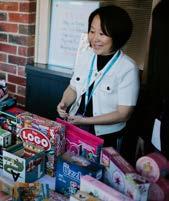





This year, we have held some combined year group reunions and have received a great deal of positive feedback about how much Old Fintonians have enjoyed catching up with friends from other year groups. In 2023, we will once again be holding combined reunions.
Class of 2021/2022
Welcome Back Morning Tea
Thursday 16 February 10.30am
Class of 2018/2019
5 Year Reunion
Friday 3 March
6.30pm – 8.30pm
Class of 1993/1994
30 Year Reunion
Friday 24 March
6.30pm – 8.30pm
Class of 1983/1984
40 Year Reunion Friday 12 May 6.30pm – 8.30pm
Class of 1973/1974
50 Year Reunion Saturday 27 May 12 noon
Class of 2003/2004
20 Year Reunion
Friday 28 July
6.30pm – 8.30pm
Class of 2013/2014
10 Year Reunion
Friday 1 September
6.30pm – 8.30pm
INTERSTATE
WA
Saturday 6 May
NSW/ACT
Thursday 7 September
QLD
Saturday 21 October
SA
November – TBC
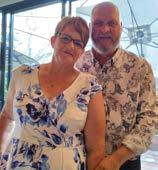
Congratulations to Alannah Biber (’84) and John who were married in March 2021. Old Fintonian, Sally Howard (Gilbertson ’84) was the celebrant.
The Fintona community is saddened to learn of the passing of the following Old Fintonians:
Bronwen Coulstock (’68) 28/10/21
Mary Howard (Bedggood ’49) 22/11/21
Anne Hawkins (Williams ’52) 1/1/22
Judith Jacka OAM (Lawrence ’55) 1/3/22
Elizabeth Wendy George (Fitch ’60) 7/3/22
Mary Mackay (’46) 8/5/22
Rosemary Annois (’57) 12/5/22
Fiona Anne Shepherd (McCaghern ’68) 29/5/22
Kathleen Metherall (Lucas ’44) 5/6/22
Mary Winifred Russell Wain (’40) 7/7/22
Joan Gabb (Hallam ’37) 8/7/2022
Congratulations to Phoebe Parker (’13) and Alex Song who were married on 27 August, 2022. Old Fintonian, Esther Chan (’11) was in the Bridal Party.

Kate Watson (Widmer ’62) 9/7/2022
Diana Hearn (Prest ’56) 10/7/22
Sue Giles (Welch ’70) 12/8/22
Margaret Bell (Hepworth ’47) 23/8/22
Diana Birch (Vial ’55) 23/8/22
Jennifer Ward (Tolley ’47) 31/8/22
Susan Anderson-Peters (Anderson ’72) 24/9/22
Lynette McAlister (Shillinglaw ’50) 15/10/22
Anthea Andrews (Canny) – past staff 29/10/2022
Biffy (Elizabeth) Robertson (’52) 31/10/22
Helen Finn (Simpson ’48) 10/11/22
BRONWEN COULSTOCK (’68)
8/9/51 - 28/10/21
It was with heavy hearts that we lost the brightest of lights, Bronwen Coulstock, to cancer on 28 October, 2021. Bronny is survived by her adoring children, Jono and Bae, loving siblings, Belinda (’70) and Tom and extended family.
Known to most as Bronny or ‘Big’, she was a unique jumble of oxymorons. So graceful and dignified, yet such a fighter. Bronny claimed she was shy yet could talk the leg off a chair. She was often found lost in her own world, yet was intensely engaged in politics, culture, her family and friends.
After graduating from Fintona in 1970, she studied economics at Melbourne University. Her professional career spanned public service, private enterprise, press, politics and tourism. She embraced them all, living life to the fullest no matter the circumstance.

Bronny was also incredibly talented as a painter, writer, seamstress, and chef. Her ability to throw a dinner party together in little time but with much pizzazz was as remarkable as her ability to remain looking elegant in orange lipstick! Bronny’s greatest talent was being ‘Granny’. She gave her four grandchildren freedom and inspiration to explore, make mistakes and grow.
Bronny will be remembered as a beacon of light and warmth in the lives of all she encountered.
ROSIE ANNOIS (’57)
30/1/1940 - 12/5/2022
Rosie Annois Bingham attended Fintona from 1947 to 1955 and loved school, especially her classmates who were to become her lifelong friends. Whilst attending Fintona, she fell in love with the Art Department where she developed her artistic talents. Rosie was a loyal Old Fintonian who loved attending reunions and always felt part of a bigger family at Fintona. Rosie went on to study at RMIT in the Fashion Department where she further developed her passion for designing women’s clothing.
Rosie married and had two children, Richard and Sarah Amos (’82) and was a devoted and compassionate mother. Rosie was a gifted watercolourist and was a member of the Victorian Watercolour Society exhibiting in many art shows.
Rosie had her own women’s fashion brand and ran a successful boutique. After owning her small business, she decided to try her hand at teaching and selling her watercolours, jewellery and assortment of bespoke crafts.
In her later years she was an active member of the Albert Park Rotarians and in 2015 received the coveted Paul Harris Award for her outstanding contribution to the community.
She will be forever remembered.
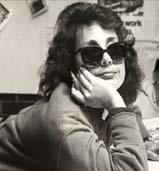 Sarah Amos (’82)
Sarah Amos (’82)
Kath attended Fintona from 1936 to 1944 and was a proud Old Fintonian who made many long-life friends from her school days. After leaving Fintona, she worked on a farm in Narre Warren assisting in training a successful team of show horses.
It was in the horse world where Kath was most at home and enjoyed the friendship of fellow competitors. Kath was the youngest winner of the coveted Garryowen trophy in 1947 and then won it again in 1949. She also won the Alice Laidlaw trophy for show jumping in 1948, a sport that she absolutely loved.

In 1950, Kath married noted horseman, Rupert Metherall and they moved to the Mallee. Kath and Rupert were successful farmers and were passionate in showing their stud sheep and cattle at Royal Shows around Australia before retiring to a farm beside the Goulburn River in Nagambie.
Kath was inducted into the Garryowen Hall of fame in 2013 and was proudly awarded the President’s Medal and life membership of the Royal Agricultural Society of Victoria (RASV) in 2017.
Kath was a loving mother, grandmother and great grandmother.
27/3/46 - 9/7/2022
The first thing everybody noticed about Kate was her smile. She would walk into a room and light it up. She took a genuine interest in everyone and stayed friends with many people she met.
There are friends she met on her first day at school at five years old with whom she remained in touch. There were her Fintona school friends, her nursing group that she trained with at the Royal Children’s Hospital, people on the ship she met when she travelled to London, nurses she met at St. Thomas’ Hospital and the many people she met when she returned to Australia. She made long-time friends at the Sydney Children’s Hospital where she worked for many years and at the counselling courses she undertook.
Even after Kate was diagnosed with cancer, she still lived life to the fullest, never complained, and always put others before herself. There were numerous overseas trips and travel in Australia even when she had to rely on using a walker and then a wheelchair to get around.
She was a lovely, caring and kind lady and will be greatly missed by all who knew her.
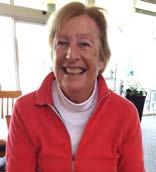
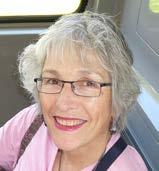
1/8/52 - 12/8/22
Sue’s life was celebrated at the Rosebud Country Club on the 19 August, 2022. It was a fitting venue as Sue loved her golf and was the Lady President. She passed away after a very short illness and was fortunate to have among her amazing support groups, her large, closely-knit friendship group of Old Fintonian friends, spanning more than 56 years which was a wonderful legacy of her school life.
Sue is remembered for her strong sporting ability. She excelled at tennis, swimming, hockey and athletics, both in Clarke House and in inter-school competitions. She will be remembered too, for her happy, fun-loving and down to earth nature.
In later years, Sue was a regular participant in the OFA golf days.
The quarterly dinners that have been held over the past 30 years by her 1970 classmates will not be the same without Sue.
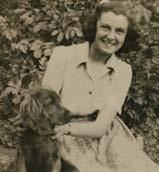
After a long-life involving family and friends, Helen Lynette Finn passed away peacefully on 10 November. She will be sorely missed by her children, grandchildren, nieces and nephews. A student at Fintona for her primary and secondary life, Helen loved School, talking fondly of her teachers, friends and Miss Cunningham. The relationships she formed during those years were ever-present in her world and an example of what it meant to be generous of spirit to all around her.
After leaving Fintona, Helen worked as a dental nurse in the T&G building in the city, before marrying and starting a family with Paul Finn, their union strong for 67 years until his death in 2020.
Helen cared for her mother whilst bringing up five children, work that is easy to underestimate. She went on to raise funds for Berry Street services and to become a blood donor for just shy of twenty years. When defining Helen, most would say she was a wonderful friend who had an uplifting effect on those who spent time with her. To the people who knew her best, she was a genuine person who offered unfaltering strength, optimism and good sense.
This year’s Careers Evening saw a number of Old Fintonians returning to Fintona to share their career journeys and life experiences with senior students. Thank you to Penelope Laletas (’11), Dr Kathy Song (’10), Emily Stothers (’01), Lawra Bello (’16), Dr Annie Lewis (’85), Phoebe Parker (’13) and Georgie Stayches (’93) and current parents, Associate Professor Maryza Graham and Dr Richard Retallick who gave some valuable insight into a wide range of professions and industries.
Here are the career overviews of the three keynote speakers:
PENELOPE LALETAS ASSOCIATE DIRECTOR, LIGHTHOUSE INFRASTRUCTUREAfter Year 12, Penelope completed a Bachelor of Commerce (Finance) and Bachelor of Laws at Deakin University. She also holds a Graduate Diploma of Chartered Accounting.
Penelope recently started a new role as part of the Investment Team at Lighthouse Infrastructure focusing on origination and execution of investment opportunities. Previously, Penelope was a Manager in the Commercial Advisory and Transactions team in the infrastructure division at KPMG. She provided strategic, financial and commercial advice to government in relation to transport and social infrastructure projects and helped the government plan for what infrastructure the city needed to invest in. Penelope first started at KPMG as an intern in their Deal Advisory Vacationer Program and was then offered a role in their Graduate Program.
Passionate about science at school, Kathy went on to study at the University of Melbourne first completing a Bachelor in Biomedicine majoring in Anatomy/Human Structure and Function then a Doctor of Dental Surgery. During her studies, Kathy worked part time at a dental practice as a dental assistant to get a feel for general dentistry and during her final year participated in rotations that served rural communities across Victoria and metropolitan public clinics in Melbourne.
For the past five years, Kathy has worked as an associate dentist at The Dental Room and performs all aspects of general and cosmetic dentistry, implants and orthodontic treatment. Kathy says that dentistry is a combination of being a people person and communicating well with others, using a skill set to problem solve during extensive treatment plans and uses artistry when it comes to cosmetic treatment and even day to day fillings.
L – R: Dr Kathy Song (’10), Phoebe Parker (’13), Penelope Laletas (’11), Emily Stothers (’01), Lawra Bello (’16), Georgie Stayches (’93), Dr Annie Lewis (’85), Rachael Falloon, Principal
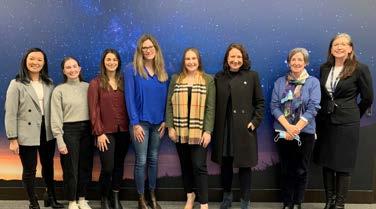
Emily obtained a double degree of Bachelor of Laws and Bachelor of Arts (International Relations) from Deakin University. She is an experienced Senior In-house Legal Counsel with demonstrated experience in working in and managing the in-house legal function for licensing and distribution businesses (Australian and global).
Currently, Emily is the Head of Business and Legal Affairs at Madman Entertainment, a film distribution company and is responsible for overseeing all the contractual arrangements which initially trigger the acquisition of distribution rights to a film and then the subsequent contracts and legal matters that sit behind a film’s standard release path. Additionally, her role focuses on the management of all legal considerations involved in operating and managing two video on demand streaming platforms, DocPlay and Garage.
Congratulations to Old Fintonian, Georgia Griffith (’14) who competed in her second Commonwealth Games this year. Georgia ran in the 800m and 1500m heats at the Commonwealth Games in Birmingham and ran her best time for the season.


What a wonderful celebration for over 120 Old Fintonians and past staff who returned to Fintona for the inaugural Blue & Gold Luncheon. Held in the Margaret Cunningham Hall, guests representing the year groups of 1945 to 1972 had a wonderful time catching up with old friends and sharing memories of their school days. Many participated in a tour of the school prior to the Luncheon and enjoyed seeing the familiar buildings of Tourmont and Glencairn and the latest addition, the Annie Hughston Centre. We look forward to hosting the Blue and Gold Luncheon again in 2024.
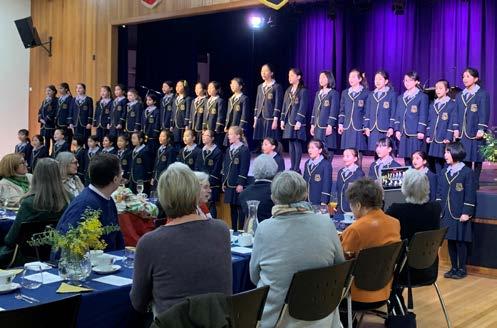
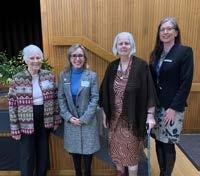

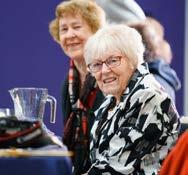
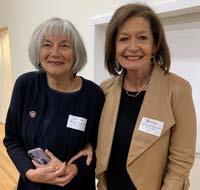

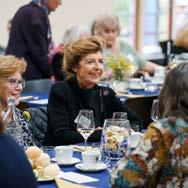
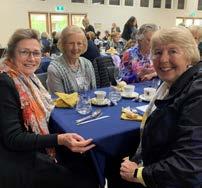

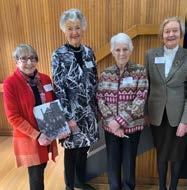


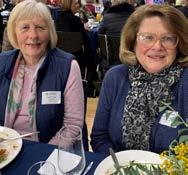
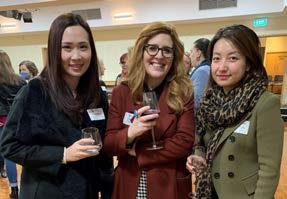
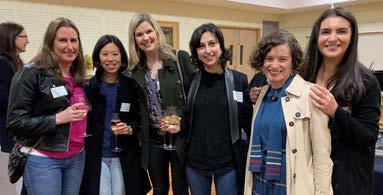

Class
of 2002 with Rachael Falloon, Principal, Julie Goldsworthy, Jenny Antcliffe, and Anne Hotta, past staff L – R: Cathy Menz (Kinnear), Vivienne Lee, Melany Antcliffe, Nectaria Cavalieros, Katherine Wynn, Farah Halabi (El-Bay) L – R: Crystal Yung, Jessie Fowler, Nannan Yu
Class of 2010 with Rachael Falloon, Principal, Chris Williams, staff, Ann Hawker, Archivist, Julie Goldsworthy, past staff


Class of 2011 with Rachael Falloon, Principal, Chris Williams, staff, Ann Hawker, Archivist, Julie Goldsworthy, past staff
Class of 2012 with Rachael Falloon, Principal, Chris Williams, staff, Ann Hawker, Archivist, Julie Goldsworthy, past staff
L - R (back): Rachael Falloon, Principal, Jenny Danks (Boyd ’80) Linda Barnes (Baker ’59), Barbara Shaw (Thompson ’67), Janet Ojerholm (Brown ’56), Kate McPhee, Communications & Community Officer

L - R (front): Marian Paynter (Lobban ’60), Amanda Gordon (Drummond ’60), Barbara Brady (Cooper ’51), Jenny Della Torre (McKendrick ’62)
L – R (back): Adele Outteridge (Samuel ’63), Barbara Gunn (’64), Mary Cameron (Haywood ’58), Rachael Falloon, Principal


L – R (front): Angela Goldman (Fergie ’77), Helen Jane (’78), Jessica O’Bryan (’87) Jenny Bakken (Moore ’61)
L – R: Sally Eastoe (Randall ’75), Sam Wilson (Rogers ’84), Claire Hewitt (Touzel ’70), Liz Cramer (Howitt ’70 ), the four top players for the day
The Board and Management acknowledge with great appreciation the following members of our community, and those who wish to remain anonymous, for their generous philanthropic gifts made this year.
Please accept our thanks for your support.
Mr G D Ash & Mrs K Ash
Mr M Aulakh
Mr J J Badham
Mrs P F Badham
Mr T Bakirtzis & Mrs K Bakirtzis
Ms E A Balderstone
Mrs J E Besley & Mr G D Besley
Ms J Bethell & Mr P Smart
Mr S Biondo & Ms Y Yaginuma
Mr S Black & Mrs S Black
Mr J F Bolton & Mrs T Bolton
Mrs P Boschetto & Mr C Boschetto
Dr S Bouralexis & Dr S Sarantopoulos
Mrs J Brash
Mr Y Cai & Ms Y Zhao
Mr Z Cai & Mrs Y Cai
Mr P K L Chan & Ms S Koo
Mr B Chen & Ms Z Li
Mr C Chen & Mrs L Chen
Mr J Chen & Mrs C Yang
Mr P Chen & Mrs C Yang
Mr S Chen & Mrs M Chen
Mrs Y Chen & Mr J Chen
Mr T P Chenu & Mrs B Chenu
Mr J Cho & Mrs Y Lee
Dr Z A Chowdary & Mrs A N Khan
Mr K Chung & Ms M Li
Mr B Commerford & Mrs J
Commerford
Mr S J Cronin & Ms R N Vitarelli
Mr D Curry
Mr Q Dai & Ms L Wang
Mr J Dalton
Mr K Dang & Ms S Gao
Dr H Derakhshani & Mrs M Sayadi
Mr S Dewal & Mrs S Dewal
Mr L Ding & Mrs H Dai
Mr H Dong & Mrs M Qu
Dr J C Dowling & Professor J M L
Brotherton
Mr J Du & Mrs Y Tan
Mr Z Du & Mrs X Yin
Ms R Falloon
Mr X Fan & Ms R Liang
Mr I Fang & Ms B Wu
Mr Q Fang & Ms Y Jia
Mr Y Fang & Mrs Y Wang
Mrs P Farmer
Mr X Fei & Ms H Zhu
Mr N Fels & Mrs R Fels
Ms D P Fleming & Mr B L Masters
Mr C Fosdick & Ms B Bye
Mr C Frost & Mrs M Frost
Mrs J Fu & Mr J Chen
Mr R Fu & Ms L Li
Mr Y Fu & Mrs X Cui
Mrs K E Gale & Mr A J W Gale
Mr Q Gao & Ms M Liu
Dr K A Gassert & Mrs H R Gassert
Mr Y Geng & Mrs Y Huo
Mr J Georgarakis & Ms L Teti
Dr D M Gerstman
Mr J L Gonsalves & Mrs M G Gonsalves
Mrs A M Gordon
Mr D E Gray & Ms W Mak
Mr H Gu & Miss X Zhang
Mr J Guo & Mrs H Peng
Miss S Guo
Mrs J T Hadges
Mrs Y V Han & Mr C M Ma
Mr D J Hartnett & Ms A Tennakoon
Mr R He & Ms L Ye
Mr T Hinh & Ms E Lee
Mr T Ho & Ms A Weng
Mr M Hookey & Mrs T Leong Hookey Dr C How
Mr H Huang & Ms I Zhang
Dr L Huang & Ms T H Weng
Mr B Huo & Mrs H Cai
Dr J Huynh & Dr H Tran
Mr A G Jenkins & Mrs R M Jenkins
Mr T Jeyaretnam & Dr L Jeyaretnam
Mr Q Ji & Ms Y Dai
Ms X Ji & Mr C Yim
Mr Z Jiang & Mrs S Xie
Mr C Jin & Mrs S Lin
Mr S M Johnson & Mrs L Johnson
Dr E Kandare & Dr G Chirima
Mr N Kang & Ms Y Lai
Mr F Kaoy & Ms H Yang
Dr A B Kapoor & Dr A Kapoor
Mr K Kapur & Mrs T Kapur
Mr J Karametos & Mrs D Karametos
Mr F Ke & Ms X Lin
Mr A G & Mrs V E Kemp
Mr H Lai & Ms W Xia
Dr B Land & Dr J Alexander
Mr Y Langainarayanan & Dr K S Yathavan
Dr D Lau & Mrs L Lau
Mr W Lau & Ms W Yuen
Mr C Lauder & Mrs N Lauder
Dr H Lazaris & Dr M Lazaris
Dr M J Lear & Mrs A L Lear
Dr D W C Lee & Dr S Lee
Mrs C A Levi
Mr A Lewin & Mrs T Lewin
Mr P Lewis & Mrs T H Lewis
Mr B Li & Mrs J Chen
Dr C Li & Mrs F Li
Mrs H Li & Mr Z Zhou
Mr H Li & Mrs W Huang
Mr J Li & Ms C Ling
Mr X Li & Mrs Z Liu
Mr S Liang & Ms Q Zhan
Mr Z Liang & Mrs M Liu
Mr J C Liao & Ms J Y Huang
Dr W Lim & Ms R Liang
Mr R Linsdell & Mrs Q Ma
Mr D J Little & Mrs M W M Tan
Mr F Liu & Ms X Lin
Mr A Longo & Mrs L Longo
Mr P Lu & Ms Y Wang
Mr W Lu & Dr W Lou
Dr M Lucas & Mrs M Lucas
Mr D Luo & Mrs Y Qiu
Mr X Ma & Mrs R Xu
Mr T Madden & Mrs R Madden
Ms M Maglitto
Mr W Malic & Mrs T Malic
Mrs A & Mr S Mansour
Mrs X Mao & Mr C Zhao
Mr D M Marques & Dr S Chew
Mr D A Martin & Mrs C M Martin
Mrs L McAlister
Mrs L A McClenaghan
Ms A McIntosh
Mr H J McKenzie & Mrs J K McKenzie
Mr S J McNally & Ms J M Hayman
Mr Z Mei & Mrs M Shao
Dr D H Membrey & Dr L C Membrey
Mr Q Miao & Mrs H Yan
Dr P Mihailescu & Dr N L Sinha Roy
Mrs J Mitchell
Mr Y Moon & Ms J Lee
Dr M Mukhlif & Dr S Abdullah
Dr P T Q Nguyen & Mrs A O Nguyen
Mrs X Niu & Mr H Liu
Ms S Nyambek
OFA Western Australian Fintonians
Dr A Ong & Dr E H Ma
Dr S H Orakzai & Mrs S Shahzad
Mr J R Pace & Mrs J L Pace
Mr S H Parmenter & Ms E K
Parmenter
Dr H Pedram & Dr S Hashemi
Mrs H Peng & Mr J Guo
Miss A E Perryman
Mr M Pitsillou & Ms E Brew
Dr S Rathnayake & Mrs S Rathnayake
Dr D T Ratnam & Dr I Thevarajan
Dr R Retallick & Ms E E Bolitho
Dr E Roberts & Mr N Roberts
Mr M Roche
Mr S Rockey & Mrs E Rockey
Mrs A C Rodriquez
Mr S Salgadoe & Mrs A Salgadoe
Dr S Salimi & Dr M Horriat
Mr J Sampsonidis & Mrs M
Sampsonidis
Mrs M Schoeffel
Mr D Sethi & Mrs A Sapra
Dr R Sethi & Dr K D Kaur
Mrs M Shao & Mr Z Mei
Mr F Shen & Ms Y Lu
Mr D Shi & Mrs W Jing
Dr A Singh & Dr P Bordbar
Mr J Sirianni & Mrs J Sirianni
Dr A S Siswojo & Mrs I Djohan
Mr T Sit & Ms B Young
Mr S Sivasubramaniam & Mrs S Sivarajah
Mrs A Smith
Mr J L Snaden & Ms F L Wyber
Dr C Solnordal & Dr A Dennis
Mrs M C Spano & Mr J L Spano
Mr S D Spindler & Mrs I C Spindler
Mr G Stanley & Mrs J Stanley
Mr J G Stefanatos & Mrs T P Stefanatos
Dr G Stefanou & Mrs A Stefanou
Mrs L A Steven Mrs M Stevens
Mr B Sun & Mrs J Pan
Mr L Sun & Mrs Y Dai
Mr H Tang & Ms Y Jiang
Mr C Tavlaridis & Mrs N Koutrouza
Tavlaridis
Mr S Thavaraj & Dr D Sivakumar
The Bryan and Rosemary Cutter
Foundation
Mr M M Thompson & Ms K M Parker
Mr M J Tropea
Mrs C A Vickers-Willis & Mr R Vickers-Willis
Mr M Walters & Ms F Mason
Mr D Wang & Mrs D Peng
Mr H Wang & Mrs M Wang
Mr J Wang & Ms D Qiu
Mr J Wang & Mrs F Gong
Ms Y Wang
Mr Y Wang & Ms J Yuan
Mr Z Wang & Ms J Sun
Mr Z Wang & Ms T Ding
Mr S Wei & Mrs S Lu
Mr S J Wilson & Mrs M Wilson
Mr A Wimalasuriya & Mrs B Wimalasuriya
Mr R S Wotherspoon & Dr T S Penovic
Mr Y Xiong & Ms Y Zhang
Mr F Xu & Ms H She
Mr K Xu & Mrs P Cai
Dr W Xu & Ms Z Deng
Mr J H Xue & Mrs A Xue
Mr Y Yan & Ms J Qin
Mr G Yang & Mrs H Gu
Mr J Yang & Mrs J Zhang
Mr T Yang & Mrs X Long
Miss C Yeoh
Mr S You & Ms W Huang
Mr K Yu & Mrs D Yu
Mr K Yung & Ms T Mak
Mr D Zhai & Mrs X Tan
Mr S Zhang & Ms L Zhang
Mr W Zhang & Mrs J Qian
Mr J Zhao & Mrs H Wang
Mr L Zhou & Mrs S He
Mr W Zhou & Mrs Y Xing
Mr Z Zhou & Mrs H Li
Mr L Zhu & Mrs P Yu
Mr Z Zhu & Mrs J Li
